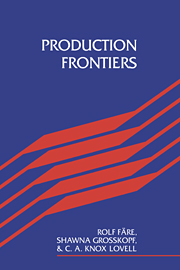Book contents
- Frontmatter
- Contents
- List of Figures
- List of Tables
- Preface
- 1 Introduction
- 2 Production Technology
- 3 Input-Based Efficiency Measurement
- 4 Output-Based Efficiency Measurement
- 5 Indirect Input-Based Efficiency Measurement
- 6 Indirect Output-Based Efficiency Measurement
- 7 The Measurement of Price Efficiency
- 8 Graph Efficiency Measurement
- 9 Efficiency Measurement and Productivity Measurement
- 10 Topics in Efficiency Measurement
- A Standard Notations and Mathematical Appendix
- References
- Biographical Index
- Index
2 - Production Technology
Published online by Cambridge University Press: 23 October 2009
- Frontmatter
- Contents
- List of Figures
- List of Tables
- Preface
- 1 Introduction
- 2 Production Technology
- 3 Input-Based Efficiency Measurement
- 4 Output-Based Efficiency Measurement
- 5 Indirect Input-Based Efficiency Measurement
- 6 Indirect Output-Based Efficiency Measurement
- 7 The Measurement of Price Efficiency
- 8 Graph Efficiency Measurement
- 9 Efficiency Measurement and Productivity Measurement
- 10 Topics in Efficiency Measurement
- A Standard Notations and Mathematical Appendix
- References
- Biographical Index
- Index
Summary
Introduction
In this chapter we expose the reader to the production models relative to which efficiency will be evaluated. We include models whose map sets are in quantity space and models whose map sets are in price space. More specifically, the first group of models is divided into those which involve input quantities and output quantities, such as the graph of the technology and the input and output correspondences. The first group of models also includes those which are value constrained. In the value constrained group we include the cost indirect output correspondence and the revenue indirect input correspondence. Examples of models with map sets in price space include the dual input and dual output correspondences. All these models are introduced in Section 2.1.
To avoid an overwhelming number of technicalities, little or no discussion is devoted to the particular properties different models possess. However, in the piecewise linear formulation of these models developed in Section 2.4, the properties relevant for efficiency measurement are derived.
In Section 2.2 we introduce two sets of notions that model variation in the size of operation of a production unit. First we define returns to scale with respect to each of the seven models introduced above, and then we define the notion of returns to diversification. Thus in Section 2.2 both scaling and addition in production are discussed.
Disposability – both weak and strong – is discussed in Section 2.3. In particular, since some outputs may be “bads” and some inputs may cause congestion, we need both concepts. If, for example, outputs are strongly (also termed freely) disposable, then any output can be discarded without resource use or cost.
- Type
- Chapter
- Information
- Production Frontiers , pp. 24 - 60Publisher: Cambridge University PressPrint publication year: 1993
- 6
- Cited by



